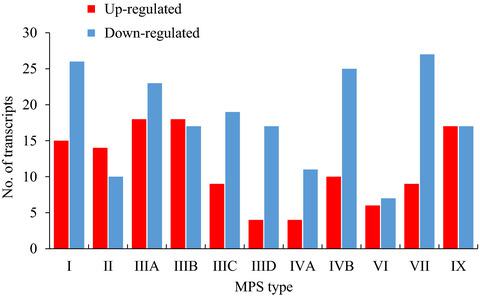当前位置:
X-MOL 学术
›
FEBS Lett.
›
论文详情
Our official English website, www.x-mol.net, welcomes your feedback! (Note: you will need to create a separate account there.)
Transcriptomic analyses suggest that mucopolysaccharidosis patients may be less susceptible to COVID‐19
FEBS Letters ( IF 3.5 ) Pub Date : 2020-09-06 , DOI: 10.1002/1873-3468.13908 Karolina Pierzynowska 1 , Lidia Gaffke 1 , Grzegorz Węgrzyn 1
FEBS Letters ( IF 3.5 ) Pub Date : 2020-09-06 , DOI: 10.1002/1873-3468.13908 Karolina Pierzynowska 1 , Lidia Gaffke 1 , Grzegorz Węgrzyn 1
Affiliation

|
We used transcriptomic (RNA‐seq) analyses to determine whether patients suffering from all types and subtypes of mucopolysaccharidosis (MPS), a severe inherited metabolic disease, may be more susceptible to coronavirus disease 2019 (COVID‐19). The expression levels of genes encoding proteins potentially involved in SARS‐CoV‐2 development were estimated in MPS cell lines. Four genes (GTF2F2, RAB18, TMEM97, PDE4DIP) coding for proteins potentially facilitating virus development were down‐regulated, while two genes (FBN1, MFGE8), the products of which potentially interfere with virus propagation, were up‐regulated in most MPS types. Although narrowing of respiratory tract and occurrence of thick mucus, characteristic of MPS, are risk factors for COVID‐19, transcriptomic analyses suggest that MPS cells might be less, rather than more, susceptible to SARS‐CoV‐2 infection.
中文翻译:

转录组学分析表明,粘多糖贮积症患者可能不太容易感染 COVID-19
我们使用转录组 (RNA-seq) 分析来确定患有所有类型和亚型的粘多糖贮积症 (MPS)(一种严重的遗传性代谢疾病)的患者是否可能更容易感染 2019 年冠状病毒病 (COVID-19)。在 MPS 细胞系中估计了编码可能参与 SARS-CoV-2 发展的蛋白质的基因的表达水平。编码可能促进病毒发育的蛋白质的四个基因(GTF2F2、RAB18、TMEM97、PDE4DIP)被下调,而在大多数 MPS 类型中,可能干扰病毒传播的两个基因(FBN1、MFGE8)被上调. 尽管 MPS 的特征性呼吸道变窄和粘液粘稠是 COVID-19 的危险因素,但转录组分析表明 MPS 细胞可能更少,而不是更多,
更新日期:2020-09-06
中文翻译:

转录组学分析表明,粘多糖贮积症患者可能不太容易感染 COVID-19
我们使用转录组 (RNA-seq) 分析来确定患有所有类型和亚型的粘多糖贮积症 (MPS)(一种严重的遗传性代谢疾病)的患者是否可能更容易感染 2019 年冠状病毒病 (COVID-19)。在 MPS 细胞系中估计了编码可能参与 SARS-CoV-2 发展的蛋白质的基因的表达水平。编码可能促进病毒发育的蛋白质的四个基因(GTF2F2、RAB18、TMEM97、PDE4DIP)被下调,而在大多数 MPS 类型中,可能干扰病毒传播的两个基因(FBN1、MFGE8)被上调. 尽管 MPS 的特征性呼吸道变窄和粘液粘稠是 COVID-19 的危险因素,但转录组分析表明 MPS 细胞可能更少,而不是更多,



























 京公网安备 11010802027423号
京公网安备 11010802027423号